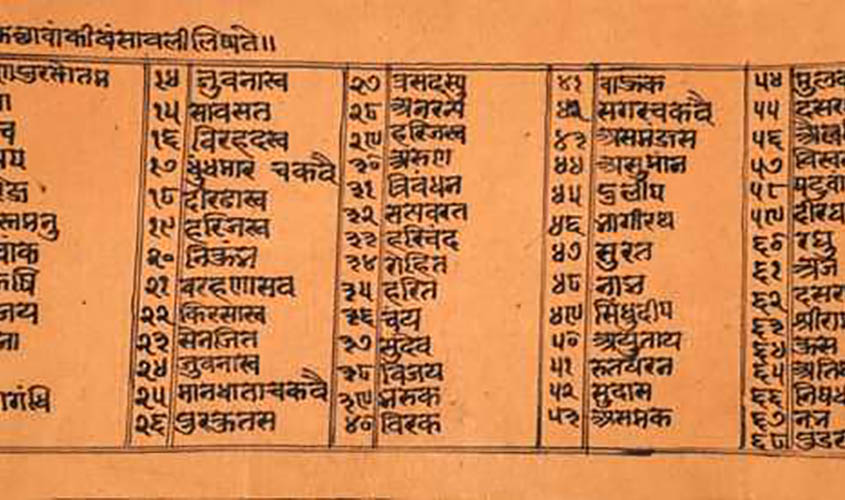BJP’s Rajsamand MP and erstwhile Jaipur ex-princess Diya Kumari has claimed that the descendants of Lord Ram are all over the world, including her family, who descended from his son Kush.
Diya told The Sunday Guardian that “My claim is based on historical manuscripts and documents we have in the City Palace museum. I am responding as the SC has inquired whether there are any descendants of Lord Ram.” The late Brigadier Maharaja Sawai Bhawani Singh, her father, had produced the documents in court in 1992, she said. Bhawani Singh and the ex-royal family of Jaipur used to declare that they were direct descendants of Kush. Rani Padmani, the former queen of the Jaipur royal family, had asserted that they were the 309th descendant of Kush. “We want the Ram Mandir to be built in Ayodhya,” Diya said.
Modi is a warrior like us: BSF Jawan
“This is the best gift India has got on the eve of Independence Day,” a Border Security Force jawan told this writer while voluntarily giving his response on the scrapping of Article 370 providing special status to the erstwhile state of Jammu and Kashmir. This was the best response that this writer came across on the matter. The young paramilitary man, belonging to Uttar Pradesh, did not know anything about Article 35A, which too became defunct that was also made defunct by both Houses of Parliament recently. “Only Prime Minister Narendra Modiji could have done this,” he said, adding “I salute him for saving us from the humiliation that we men in uniform were suffering in Kashmir for long.” Then he clicked his heels to stand in attention and saluted in the direction of Parliament House, thumping his assault rifle sharply.
This happened the day the Rajya Sabha passed the J&K Reorganisation Bill with two-third majority. I had stepped out of the Metro station’s exit lift at Rail Bhavan to go to Parliament House. As I exited from the lift, it was raining. Some paramilitary men and Delhi Police personnel were under the canopy to avoid getting wet. With a wide smile, our BSF jawan said, “Wait, you will get wet…tab tak batiyate hein (let us talk till rain stops).” And he shot a question at me, “Do you think scrapping of Article 370 is good?” Anticipating his mood, I said yes. Thrilled, he said, “I knew it. Only brave Modiji could have achieved this feat. Till he came in 2014, we were fighting the battle in the valley with one hand tied behind our back. We faced so much humiliation. Once a young boy threw a plastic bag containing human excreta at us in the valley and we could not do anything. No more! We will no longer tolerate such a dirty thing.” Turning emotional, he said “I had realised this man Modi as special, when I first met him in the Rann of Kutch in 2013. He was Gujarat Chief Minister and had visited the place where our unit was posted. Modiji only called jawans for interaction. I told him about the serious problem in drinking water. He told me that in 30 days our problem would be solved. We couldn’t believe it when a big water pipeline reached us with constant supply of water in 25 days.” Showing his 2013 picture with Modi, the jawan concluded, “Today, I salute Modi again for his wonderful job in Kashmir. He is a warrior like us.”
Paan at Indian banquet in Islamabad
A long-time reader of The Sunday Guardian has written to us recalling an interesting 50-year-old anecdote, post the 1965 India-Pakistan war, when Islamabad had snapped diplomatic and trade links with India, like at present. Trade between the two countries remained suspended for 10 years after the 1965 war. Our reader, R.K. Puri, a retired senior bureaucrat, was the then Director, South Asia desk in the Ministry of Commerce. A Pakistani trade delegation visited India in December 1974 to break the thaw. India sent an inter-ministerial trade delegation to Islamabad in January 1975. It was led by the late Y.T. Shah, then Secretary, Commerce Ministry. Puri was part of the delegation. Puri says that the talks went well. The only hiatus was over the “offer lists” of each country’s trade items. India’s 200 items offer list was pruned on Islamabad’s request as it could have political repercussions in Pakistan. An agreement was signed on 23 January 1975 by Shah for India and his counterpart, Ezaz Ahmed Naik, who hosted a banquet in honour of the Indian delegation. In his speech, Naik remarked that the leader of the Indian delegation (Shah) could well be the name of the leader of Pakistan delegation while he (Naik) could be the name of the leader of Indian delegation. This quip made it to the front pages of Pakistan media the next day.
Puri recalls that Shah hosted a return banquet on the concluding day and sprang a surprise when he revealed in his speech that as people in Pakistan had been starved of the Indian paan for 10 long years, special arrangements were made by the Indian delegation to bring paan from India for serving to the Pakistani delegates. “On Shah’s signal, the hotel staff marched in with trays loaded with the Indian paan wrapped in silver foils. This was greeted by the guests with loud cheers. They not only relished it but carried one or two paans for their wives and parents. This became front page news in Pakistani newspapers.

